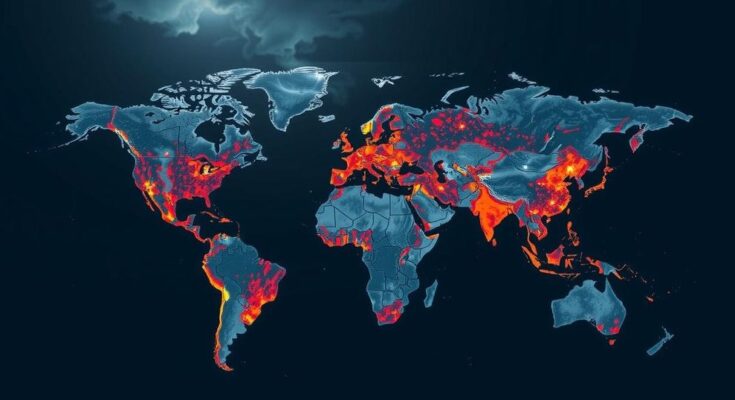A report reveals that extreme weather has caused $2 trillion in costs globally over the past decade, with $451 billion incurred in the last two years. This situation is addressed at the Cop29 climate summit, focusing on financial support from developed nations to developing countries to manage climate impacts and economic adaptations. Significant losses highlight the immediate threats posed by climate change to various economies, particularly affecting poorer communities.
A recent report has highlighted that extreme weather events have inflicted $2 trillion in damages globally over the past decade. This analysis, which evaluated 4,000 climate-related incidents, reveals that the economic toll reached $451 billion in just the last two years. While discussions continue among global leaders at the Cop29 climate summit regarding financial support from wealthy nations to assist developing countries, evidence suggests that the impact of climate change is already being felt profoundly in various economies. John Denton, secretary-general of the International Chamber of Commerce, emphasized the urgent reality of climate change, stating, “The data from the past decade shows definitively that climate change is not a future problem.” The report identified a significant upward trend in costs associated with extreme weather from 2014 to 2023, particularly noting a peak in 2017 correlated with a severe hurricane season affecting North America. The United States experienced the highest economic losses, totaling $935 billion, followed by China and India with $268 billion and $112 billion, respectively. The report illustrates that as wealth increases and populations settle in disaster-prone areas, the financial repercussions of fire, flooding, and heat intensify. Despite the findings indicating a direct link between climate change and extreme weather, researchers have struggled to comprehensively assess the anthropogenic input exacerbating these events. For instance, the European summer heatwave of 2022 resulted in over 68,000 heat-related fatalities, with climate change being a contributing factor. Disaster economist Ilan Noy has noted that the report’s figures reflect a broader trend observed in earlier studies, albeit with significant caveats. He cautioned that the data does not fully capture the devastating impact on vulnerable communities and poorer countries, as most recorded losses are concentrated in high-income nations. “Clearly, the losses of homes and livelihoods in a poor community in poor countries are more devastating in the longer term than losses in wealthy countries where the state is able and willing to assist in recovery,” he remarked. The International Chamber of Commerce has called on global leaders to expedite financial aid to countries in need, advocating for investments to curb pollution and adapt to climate impacts. Such funding should be viewed as essential support rather than mere philanthropy, according to Mr. Denton, who posited that every dollar invested leads to a more resilient global economy from which all nations can benefit.
The financial damages associated with extreme weather events, exacerbated by climate change, have surged markedly over the past decade. This trend not only reflects the escalating severity of such events but also indicates the growing economic burden placed on both developed and developing countries. At the COP29 climate summit, the dialogue around the responsibilities of affluent nations to assist less affluent counterparts in transitioning towards sustainable practices is central. There is a pressing recognition that while high-income countries may face substantial fiscal losses, the long-term devastation suffered by poorer nations remains disproportionately higher due to limited resources for recovery and adaptation.
In summary, the extensive financial impact of extreme weather events underscores the urgency for global action in addressing climate change. As outlined in the report, the burden of economic losses falls particularly hard on vulnerable communities, demanding immediate financial assistance from wealthier nations. The findings advocate not only for short-term relief but also for strategic investment in resilient infrastructures and sustainable development practices, ultimately benefiting the global economy.
Original Source: www.theguardian.com




